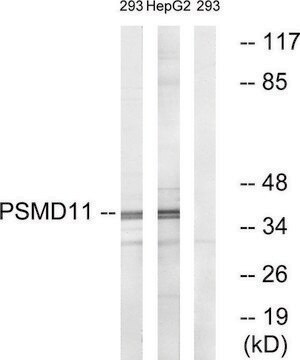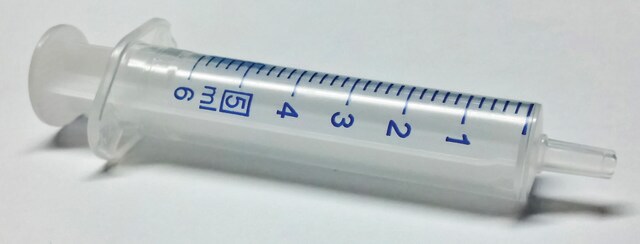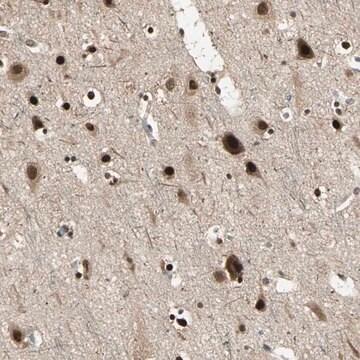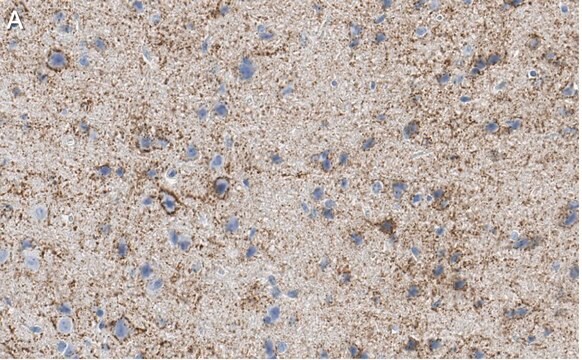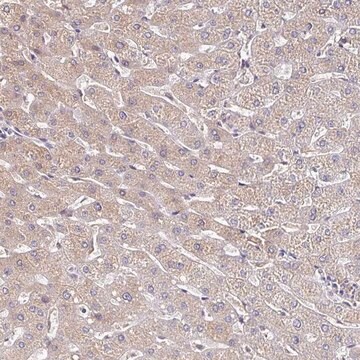HPA002044
抗-PSMC4 兔抗
Ab1, Prestige Antibodies® Powered by Atlas Antibodies, affinity isolated antibody, buffered aqueous glycerol solution
别名:
Anti-26S protease regulatory subunit 6B antibody produced in rabbit, Anti-MB67-interacting protein antibody produced in rabbit, Anti-MIP224 antibody produced in rabbit, Anti-Proteasome 26S subunit ATPase 4 antibody produced in rabbit, Anti-TAT-binding protein 7 antibody produced in rabbit, Anti-TBP-7 antibody produced in rabbit
About This Item
推荐产品
生物源
rabbit
品質等級
共軛
unconjugated
抗體表格
affinity isolated antibody
抗體產品種類
primary antibodies
無性繁殖
polyclonal
產品線
Prestige Antibodies® Powered by Atlas Antibodies
形狀
buffered aqueous glycerol solution
物種活性
mouse, rat, human
技術
immunoblotting: 0.04-0.4 μg/mL
immunofluorescence: 0.25-2 μg/mL
immunohistochemistry: 1:200-1:500
免疫原序列
LEDLYSRYKKLQQELEFLEVQEEYIKDEQKNLKKEFLHAQEEVKRIQSIPLVIGQFLEAVDQNTAIVGSTTGSNYYVRILSTIDRELLKPNASVALHKHSNA
UniProt登錄號
運輸包裝
wet ice
儲存溫度
−20°C
目標翻譯後修改
unmodified
基因資訊
human ... PSMC4(5704)
正在寻找类似产品? 访问 产品对比指南
一般說明
免疫原
應用
The Human Protein Atlas project can be subdivided into three efforts: Human Tissue Atlas, Cancer Atlas, and Human Cell Atlas. The antibodies that have been generated in support of the Tissue and Cancer Atlas projects have been tested by immunohistochemistry against hundreds of normal and disease tissues and through the recent efforts of the Human Cell Atlas project, many have been characterized by immunofluorescence to map the human proteome not only at the tissue level but now at the subcellular level. These images and the collection of this vast data set can be viewed on the Human Protein Atlas (HPA) site by clicking on the Image Gallery link. We also provide Prestige Antibodies® protocols and other useful information.
生化/生理作用
特點和優勢
Every Prestige Antibody is tested in the following ways:
- IHC tissue array of 44 normal human tissues and 20 of the most common cancer type tissues.
- Protein array of 364 human recombinant protein fragments.
聯結
外觀
法律資訊
免責聲明
未找到合适的产品?
试试我们的产品选型工具.
儲存類別代碼
10 - Combustible liquids
水污染物質分類(WGK)
WGK 1
閃點(°F)
Not applicable
閃點(°C)
Not applicable
個人防護裝備
Eyeshields, Gloves, multi-purpose combination respirator cartridge (US)
我们的科学家团队拥有各种研究领域经验,包括生命科学、材料科学、化学合成、色谱、分析及许多其他领域.
联系技术服务部门

